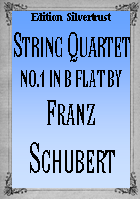Presents
Franz Schubert
 |
Schubert in 1813 Age 16 |
String Quartet No.1 in B flat Major, D.18
Franz Schubert (1797-1828), one of the most famous composers of all time, requires no introduction. However, his first six string quartets are virtually unknown and rarely heard let alone played. To learn more about their background and why that is Click Here.
Franz Schubertís String Quartet No.1 was composed sometime during 1812 by which time he had been exposed to the music of most of the major composers: Haydn, Mozart and Rossini, Beethoven excepted because his music was considered too radical and taboo by his conservative music masters. But the Quartet sounds nothing like the favorites of his teachers, those composers listed above. Instead, it begins in a completely original and unusual fashion with a slow, mysterious and substantial introduction. The main theme is moodily presented in its entirety. The atmosphere seems threatening as the dramatic tension slowly rises to a powerful thundering chordal climax. Although there is no explicit direction to play on attacca into the following Presto vivace, the final chord of the introduction is clearly indicative of this intent. The Presto is quite an exciting and stormy affair. The main theme, Vivaldi-like, is played over a continuous background of pulsing 8th and 16th notes and 16th, the effect created approaches the sound of a tremolo. Already, we can hear various touches which will be used to great effect in his later works. Most extraordinary of all is that the music really sounds nothing like Haydn, Mozart or Beethoven. Any of his teachers would have been impressed by this movement. Virtually all of them were stunned by his impressive talent and ability. If Michael Holzer, one of Schubertís most important teachers could write that ď...the lad had harmony in his little finger,Ē then the second movement, Menuetto, is proof that he had melody in his very being. The main theme of the minuet is like an Austrian Lšndler but more probably it comes direct from Schubertís inexhaustible store of divine melody. The third movement, marked Andante, has more of the sound of a of a stately, slow rococo French minuet rather than an Austrian one. The finale, Presto is exciting, having the orchestral sound of an Italian overture. The material is distributed fairly evenly between the parts, and the cello, besides being given a lot to do in this movement, even introduces the third theme, a fugue.
The quartet is original-sounding and has some rather unusual characteristics not found elsewhere. It makes no technical demands of the players and though simple, it is still effective, both good to play and to hear. We are not only pleased to offer this quartet but also the first three quartets as a book at a special price.
| (A) String Quartet No.1-Parts | $24.95 |
|
|
(B) String Quartet No.1-Parts & Score |
$31.95 |
|
| (C) String Quartet Nos.1-3-Parts | $64.95 |
|
| (C) String Quartet Nos.1-3-Parts & Score | $84.95 |
|